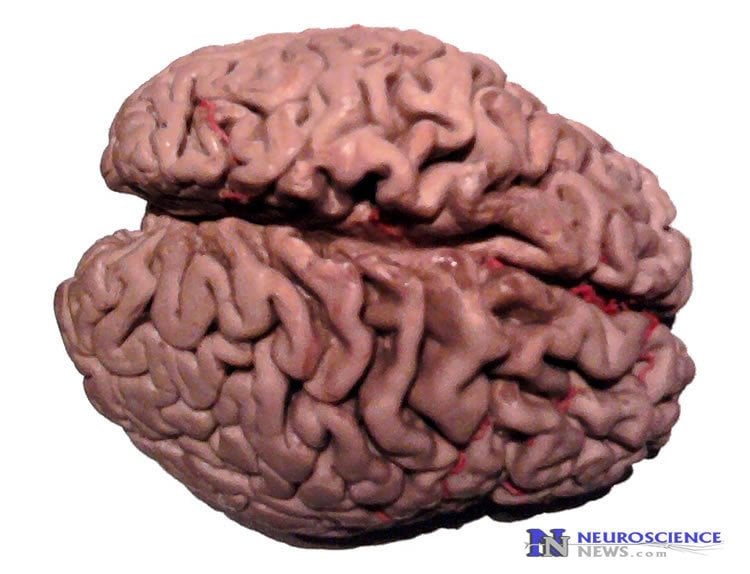Summary: Boston University School of Medicine researchers have identified several new genes associated with Alzheimer’s disease, including some which may cause functional and structural alterations in the brain. The findings could help to shed light on the processes leading up to the development of the neurodegenerative disease.
Source: BMC.
Researchers have identified several new genes responsible for Alzheimer’s disease (AD) including those leading to functional and structural changes in the brain and elevated levels of AD proteins in cerebrospinal fluid (CSF).
Unlike traditional AD research, this study focused on individual groups across specific on the cognitive spectrum [normal cognitive functioning or controls, mild cognitive impairment (MCI) and AD cases]. As opposed to the typical study design which combines all such persons into a single group or focuses only on cognitively healthy persons, this research identified several novel genetic associations within multiple subgroups.
According to the researchers these associations are not evident when comparing AD cases to controls or within AD cases, suggesting that these signals underlie processes before onset of AD. As such, these genes may be more attractive targets for drug development because it is increasingly recognized that effective drugs will be those given to persons before or shortly after they develop cognitive impairment.
The researchers tested the association between AD-related brain MRI measures, logical memory test scores and CSF levels of two AD proteins (amyloid-beta and tau) with several million genetic markers (called SNPs) across the genome in a sample of 1,189 participants of the Alzheimer Disease Neuroimaging Initiative (ADNI) study. They then examined the biological significance of the top-ranked associated SNPs and genes using several datasets containing information about gene expression in parts of the brain most affected by AD.

Two of the study-wide significant genes identified in the normal cognitive functioning group, SRRM4 and MTUS1, are involved in neuronal signaling, development and loss. Another gene identified in this group, GRIN2B, encodes a subunit of a receptor that has roles in resilience of neurons and memory.
“Our findings provide important insight about biological mechanisms leading to Alzheimer disease, especially at stages of the disease before symptoms occur,” says Lindsay A. Farrer, PhD, Distinguished Professor of Genetics and Chief of the Biomedical Genetics section at Boston University School of Medicine, and principal investigator of the study. “The novel genes we identified may be potential targets for developing new treatments that might delay or even prevent onset of symptoms of this insidious disease.”
Funding: Funding for this study was provided in part by National Institutes of Health (NIH) grants R01-AG048927, U01-AG032984, UF1-AG046198, and P30-AG13846. Data collection and sharing for this project was funded by the Alzheimer’s Disease Neuroimaging Initiative (ADNI; NIH Grant U01 AG024904). ADNI is funded by the National Institute on Aging, the National Institute of Biomedical Imaging and Bioengineering, and through generous contributions from the following: Abbott; Alzheimer’s Association; Alzheimer’s Drug Discovery Foundation; Amorfix Life Sciences Ltd.; AstraZeneca; Bayer HealthCare; BioClinica, Inc.; Biogen Idec Inc.; Bristol-Myers Squibb Company; Eisai Inc.; Elan Pharmaceuticals Inc.; Eli Lilly and Company; F. Hoffmann-La Roche Ltd. and its affiliated company Genentech, Inc.; GE Healthcare; Innogenetics, N.V.; Janssen Alzheimer Immunotherapy Research & Development, LLC.; Johnson & Johnson Pharmaceutical Research & Development LLC.; Medpace, Inc.; Merck & Co., Inc.; Meso Scale Diagnostics, LLC.; Novartis Pharmaceuticals Corporation; Pfizer Inc.; Servier; Synarc Inc.; and Takeda Pharmaceutical Company. The Canadian Institutes of Health Research is providing funds to support ADNI clinical sites in Canada. Private sector contributions are facilitated by the Foundation for the National Institutes of Health.
Source: Gina DiGravio – BMC
Publisher: Organized by NeuroscienceNews.com.
Image Source: NeuroscienceNews.com image is in the public domain.
Original Research: Abstract for “Genome-wide association study of Alzheimer’s disease endophenotypes at prediagnosis stages” by Jaeyoon Chung, Xulong Wang, Toru Maruyama, Yiyi Ma, Xiaoling Zhang, Jesse Mez, Richard Sherva, Haruko Takeyama, The Alzheimer’s Disease Neuroimaging Initiative1, Kathryn L. Lunetta, Lindsay A. Farrer, and Gyungah R. Jun in Journal of Alzheimer’s and Dementia. Published online December 20 3017 doi:10.1016/j.jalz.2017.11.006
[cbtabs][cbtab title=”MLA”]BMC “Genetic Factors that Contribute to Alzheimer’s Identified.” NeuroscienceNews. NeuroscienceNews, 3 January 2018.
<https://neurosciencenews.com/alzheimers-genetic-factors-8358/>.[/cbtab][cbtab title=”APA”]BMC (2018, January 3). Genetic Factors that Contribute to Alzheimer’s Identified. NeuroscienceNews. Retrieved January 3, 2018 from https://neurosciencenews.com/alzheimers-genetic-factors-8358/[/cbtab][cbtab title=”Chicago”]BMC “Genetic Factors that Contribute to Alzheimer’s Identified.” https://neurosciencenews.com/alzheimers-genetic-factors-8358/ (accessed January 3, 2018).[/cbtab][/cbtabs]
Abstract
Genome-wide association study of Alzheimer’s disease endophenotypes at prediagnosis stages
Introduction
Genetic associations for endophenotypes of Alzheimer’s disease (AD) in cognitive stages preceding AD have not been thoroughly evaluated.
Methods
We conducted genome-wide association studies for AD-related endophenotypes including hippocampal volume, logical memory scores, and cerebrospinal fluid Aβ42 and total/phosphorylated tau in cognitively normal (CN), mild cognitive impairment, and AD dementia subjects from the Alzheimer’s Disease Neuroimaging Initiative study.
Results
In CN subjects, study-wide significant (P < 8.3 × 10−9) loci were identified for total tau near SRRM4 and C14orf79 and for hippocampal volume near MTUS1. In mild cognitive impairment subjects, study-wide significant association was found with SNPs near ZNF804B for logical memory test of delayed recall scores. We found consistent expression patterns of C14orf40 and MTUS1 in carriers with risk alleles of expression SNPs and in brains of AD patients, compared with in the noncarriers and in brains of controls.
Discussion
Our findings for AD-related brain changes before AD provide insight about early AD-related biological processes.
“Genome-wide association study of Alzheimer’s disease endophenotypes at prediagnosis stages” by Jaeyoon Chung, Xulong Wang, Toru Maruyama, Yiyi Ma, Xiaoling Zhang, Jesse Mez, Richard Sherva, Haruko Takeyama, The Alzheimer’s Disease Neuroimaging Initiative1, Kathryn L. Lunetta, Lindsay A. Farrer, and Gyungah R. Jun in Journal of Alzheimer’s and Dementia. Published online December 20 3017 doi:10.1016/j.jalz.2017.11.006






